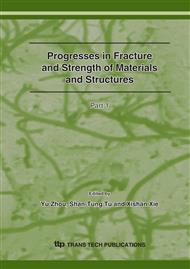[1]
National Energy Board (NEB), Public Inquiry Concerning Stress Corrosion Cracking on Canadian Oil and Gas Pipelines, NEB Report MH-2-95, Calgary, AB, Canada (1996)
DOI: 10.55274/r0012082
Google Scholar
[2]
R. N. Parkins: CORROSION/2000, Paper No. 00363, NACE International, Houston (2000)
Google Scholar
[3]
N. Sridhar, D. S. Dunn and A. Anderko: Environmentally Assisted Cracking: Predictive Methods for Risk Assessment and Evaluation of Materials, Equipment, and Structures, ASTM STP 1401, R.D. Kane, Ed., ASTM, West Conshohocken, PA, USA (2000), pp.241-258
DOI: 10.1520/stp10222s
Google Scholar
[4]
J.Q. Wang, A. Atrens, D.R. Cousens, G. Nockolds, S. Bulcock: Acta Metall. Vol. 46(1998), p.5677
DOI: 10.1016/s1359-6454(98)00246-8
Google Scholar
[5]
J.Q. Wang, A. Atrens, D.R. Cousens, N. Kinaev: J. Mater. Sci. Vol.34 (1999), p.1721
Google Scholar
[6]
J. Been, F. King, L. Yang, F.M. Song, N. Sridhar: CORROSION/2005, Paper No. 05025, NACE International, Houston (2005)
Google Scholar
[7]
R. N. Parkins, Uhlig's Corrosion Handbook, Second Edition, Edited by R. Winston Revie, New York etc, John Wiley & Sons, Inc. (2000), pp.191-300 H-charging density (mA/cm^2) Properties El ong ( %) RA ( %) I HI C% 0 10 20 30 40 50 60 70 80 -1600 -1400 -1200 -1000 -800 -600 -400 -200 0 E (mV,SCE) Iscc (%) 30℃ 50℃ EH Fig. 5 Effect of potetnial on high pH SCC susceptibility of X-70 at 30°C and 50°C . Fig. 6 Effect of hydrogen charging density on the properties of X70 in SSRT at ~ 30°C
Google Scholar


